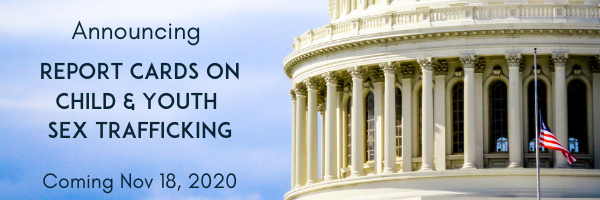About our guest author:
As a Master of Social Work candidate at the University of Alabama and part of the University’s MSW Washington D.C. program, Susannah Ayers spent the spring 2021 semester in a Policy Fellowship with Shared Hope International. Through this fellowship, she worked closely with the Policy Team to analyze and advocate for legislation that is survivor-centered and evidence-based. She attributes her fellowship experience to increasing her understanding of the issues that contribute to the sexual exploitation of minors and ways to eradicate them.
One of the many issues driving human trafficking is the demand for commercial sex. A simple economics lesson will explain that when demand for a product increases, supply will also increase in order to meet that demand. Unfortunately, the same is true with child sexual exploitation. As long as there are buyers who are willing to purchase sex with minors, traffickers will continue to ensure their supply. This principle highlights the importance of addressing demand and holding not only traffickers but also buyers accountable for their crimes.
Far too often, men who buy sex are excused for their behavior, justified by a “boys will be boys” attitude. This response perpetuates the false narrative that if an individual has enough power and financial resources, he has the right to buy anything he wants- including another person. As an example, in 2013, the Chicago Alliance Against Sexual Exploitation conducted a study of online buyers of sex in Illinois. In regards to the commonly used justification of men purchasing sex, the researchers reported that “overt and underlying assumptions about masculinity, femininity, sexuality, and prostituted women, in particular, inform men’s participation in the commercial sex industry.”[1] Without addressing these harmful, societal barriers, the problem of sexual exploitation will only continue.
The lack of buyer accountability is often evidenced in the legislation that addresses human trafficking. Currently, 19 states require evidence of third party control (or trafficker involvement) in order to establish the crime of sex trafficking. When proof of third party control is required to prosecute, it reduces or eliminates the culpability of the buyer and risks misidentification of victims who may be unable or unwilling to identify a trafficker. While any trafficker should be held accountable, the buyers should be held accountable as well. As long as there are people who are willing to purchase sex with minors, the opportunity to do so will always exist. Accordingly, legislation that requires third-party control fails to address one of the root issues that drive the sex trade.
Additionally, by necessitating evidence of third-party control, related state laws fail to identify minors engaged in survival sex as victims of sex trafficking for purposes of effectuating sex trafficking-specific responses. Survival sex is defined as an individual engaging in a sex act in order to meet a basic need. These situations could include a child who engages in sex in order to secure food or shelter. Although there may not be a trafficker who forces the child to engage in paid sex with a buyer, their need for survival forces them to make this choice. Such limited definitions of sex trafficking under state law are contrary to federal law, which includes any child engaged in commercial sex as a trafficking victim. When third party control is required, victims in this type of situation are excluded from legal remedies and connection with services given under human trafficking laws. It is also possible that the buyer is not held accountable for exploiting an individual’s basic needs in order to gain sex.
Currently, the 19 states that require evidence of third party control to establish the crime of sex trafficking are:
- Alaska
- California
- Connecticut
- Delaware
- Hawaii
- Indiana
- Iowa
- Maine
- Maryland
- Minnesota
- New Jersey
- New York
- Ohio
- Pennsylvania
- South Carolina
- Texas
- Virginia
- West Virginia
- Wyoming
What can be done to address this continued injustice? Strong legislative action is needed to ensure that buyers are held responsible for exploiting those experiencing vulnerabilities. For more information on the importance of removing third party control requirements, see Shared Hope’s policy paper entitled “Eliminating the Third Party Control Barrier to Identifying Juvenile Sex Trafficking Victims.”
What can you do?
- If you are a constituent in any of the 19 states that still require evidence of third party control, contact your legislators and educate them on the barriers that exist within current state law. Visit our campaign to learn more.
- No matter where you live, you can educate the people around you. Share Shared Hope’s fact sheet on “Why Definitions Matter” and use your sphere of influence to bring these issues to light. Challenge the idea that purchasing sex is socially acceptable and help others get involved and take action.
- Sign up to receive your state’s grade when released November 17, 2021.
For more information on ways to advocate for these and other legislative changes, visit Shared Hope’s Advocacy Action Center at https://act.sharedhope.org/actioncenter.
[1] https://icasa.org/docs/misc/caase%20report%20online%20buyers%20of%20sex%20in%20illinois.pdf








